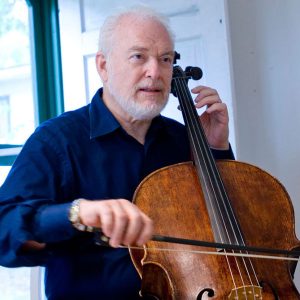Bernard Greenhouse: January 3, 1916-May 13, 2011
Paul Katz
 Bernard Greenhouse left us May 13, 2011. Please scroll to the bottom of this posting and add your personal recollections and tributes for Bernie in the comment box.
Bernard Greenhouse left us May 13, 2011. Please scroll to the bottom of this posting and add your personal recollections and tributes for Bernie in the comment box.
Bernard Greenhouse, one of my true cello heros and a man I loved and admired, passed away this morning in the middle of his 96th year. It was a peaceful death, middle of the night, in his sleep. It was not unexpected, yet it is so hard to accept. Thousands of friends, family and colleagues, generations of students will be saddened by this loss, for his music, his teaching, the legendary warmth of both his cello sound and his personality, have truly inspired the love and devotion of untold numbers.
I had been eagerly looking forward to an upcoming visit to Bernie’s home on June 4, as I was coming to Wellfleet, MA to be part of a concert honoring him. It will now be a musical Celebration of his life.
I wrote some of my personal recollections of Bernard Greenhouse in 2005, on the occasion of his 90th birthday celebration. I would like to repeat those words here:
I remember the magic of Bernard Greenhouse’s sound the first time I heard him (with The Bach Aria Group), in Pasadena, California, in 1961. The elegance, imagination, and perfection of his playing that night was an inspiration that has always stayed with me. Three months later I nearly had to kill to get tickets for The Beaux Arts Trio, but, like an addict still high from the first experience, I just had to hear that sound again. The Beaux Arts played the Dvorak “Dumky” and the Beethoven “Archduke” Trios that night, and the group and their cellist enthralled me. While listening to Bernie play, I made the decision that I must study with him, and the following September I arrived in New York to begin lessons with him.
For two inspiring years Bernie worked with me: “First, I am going to fix your left hand- hang your arm on the playing finger, roll the weight from the old to the new finger, soften the hand, prepare your shifts, align your fingers from the top to the bottom of the cello…” My facility and accuracy made giant strides. At the same time, he opened a whole new world of color for me: “Vary your bow speed and contact point, paint with your bow; modulate your vibrato to fit the dynamic and the character; experiment with fingerings, they are an important expressive tool! Don’t sing here- speak – don’t speak here -sing.” On and on, and the frustration I had always suffered from, of feeling something inside of myself but not being able to bring it out of the cello, began to lessen.
Bernie’s warmth, devotion and interest in all of his students was remarkable-he was both stern taskmaster and friend. In the summer of 1963, after a punishing season of touring, he finally got a few free weeks at his home in Wellfleet, MA. Of course, always the involved teacher, he invited this California boy for two weeks of daily lessons, yachting and clam digging on Cape Cod. (I have become even more amazed by this generosity as the years have passed, for I also adore teaching and am close to my students, but I have never ever had the energy or devotion to take them with me on holiday!)
Years went by, the Cleveland Quartet and teaching at the Eastman School became the center of my musical life, and the warmth and humanity expressed in Bernie’s sound and his words of cello advice always stayed with me. What a thrill when we began to play concerts together! Of the numerous Schubert Quintet performances we did together, one of the most memorable was at the New York Metropolitan Museum of Art at a time that the Cleveland Quartet was playing on The Paganini Strads, a quartet of instruments that had been matched, owned and played on by Paganini himself. Bernie’s own glorious Stradivari cello has, of course the same nickname of “Paganini,” and he explained that this was because his cello had been the original instrument of the quartet. For some reason, the Paganini had sold Bernie’s instrument and replaced it with the one I was using (in my opinion, a mistake, unless, perhaps, Paganini’s idea of quartet playing was to dominate!) We all had goose bumps that night when all 5 instruments were reunited on stage, and of course, I got the additional thrill of playing with my teacher.
On a more poignant note, I will never forget a recording session of the Brahms Sextets with the Cleveland Quartet, Pinchas Zukerman and Bernard Greenhouse in the late 1970′s (sorry-I’m not at all sure of the year.) At the end of a grueling day, Bernie and I left the RCA studios in New York city and started up 6th Avenue together. Bernie was barely moving and it quickly became apparent that he was unable to walk and carry his cello. He told me it was only “a little angina,” but his labored gasps for air told me otherwise. I carried both instruments, helped him into a taxi, and fought back tears, for I was sure that he had little time left.
What could be more amazing and splendid then, to be here with him almost 30 years later, in the year 2005, celebrating Bernard Greenhouse’s 90th birthday!!! Congratulations Bernie!! Bravo for a lifetime of inspired music making and teaching; the adoration and gratitude of generations of those of us behind you has been so well earned and so richly deserved!
And now, May 13, 2011, good bye Bernie, –we will miss you… and not forget you!
Subjects: Artists
